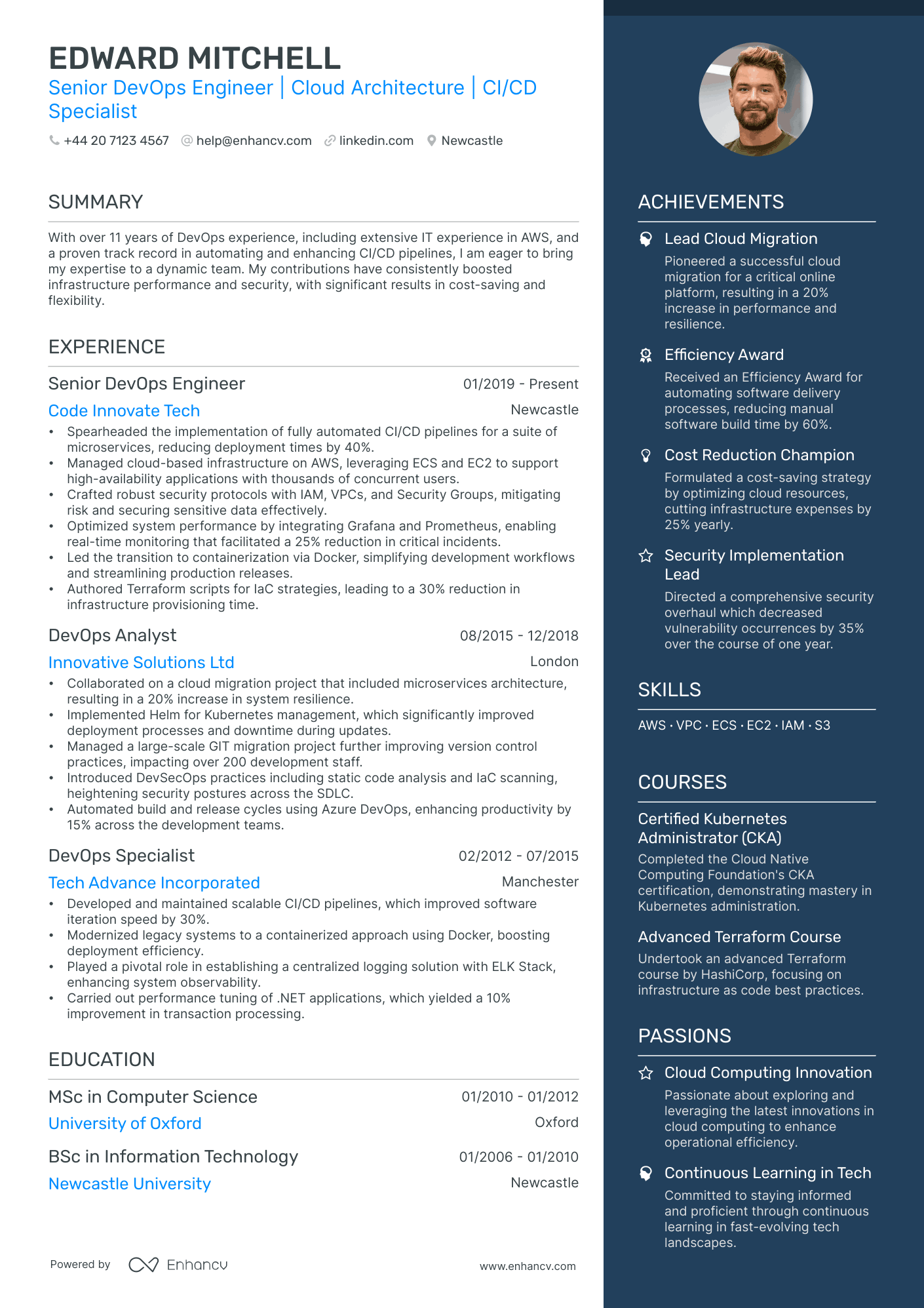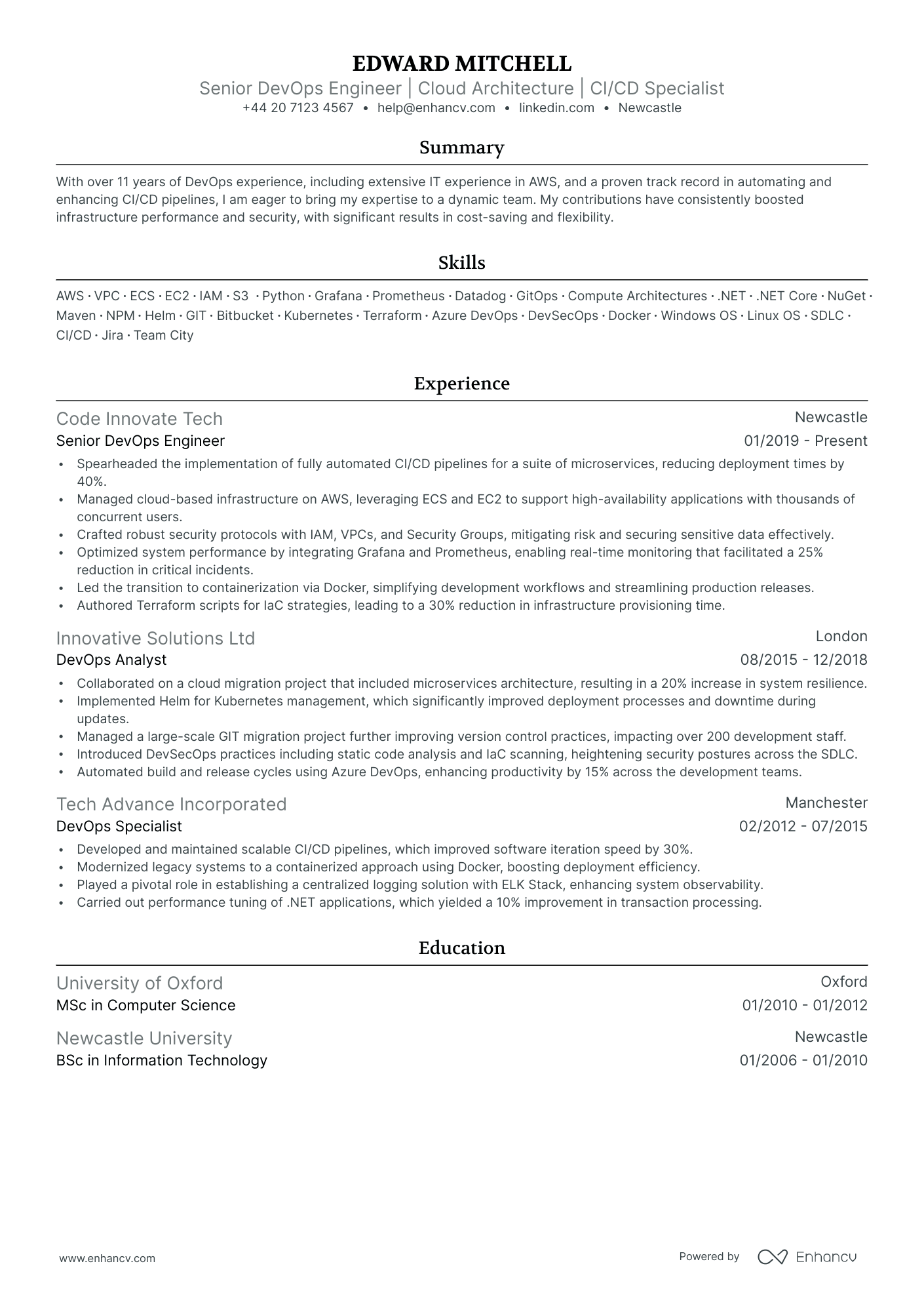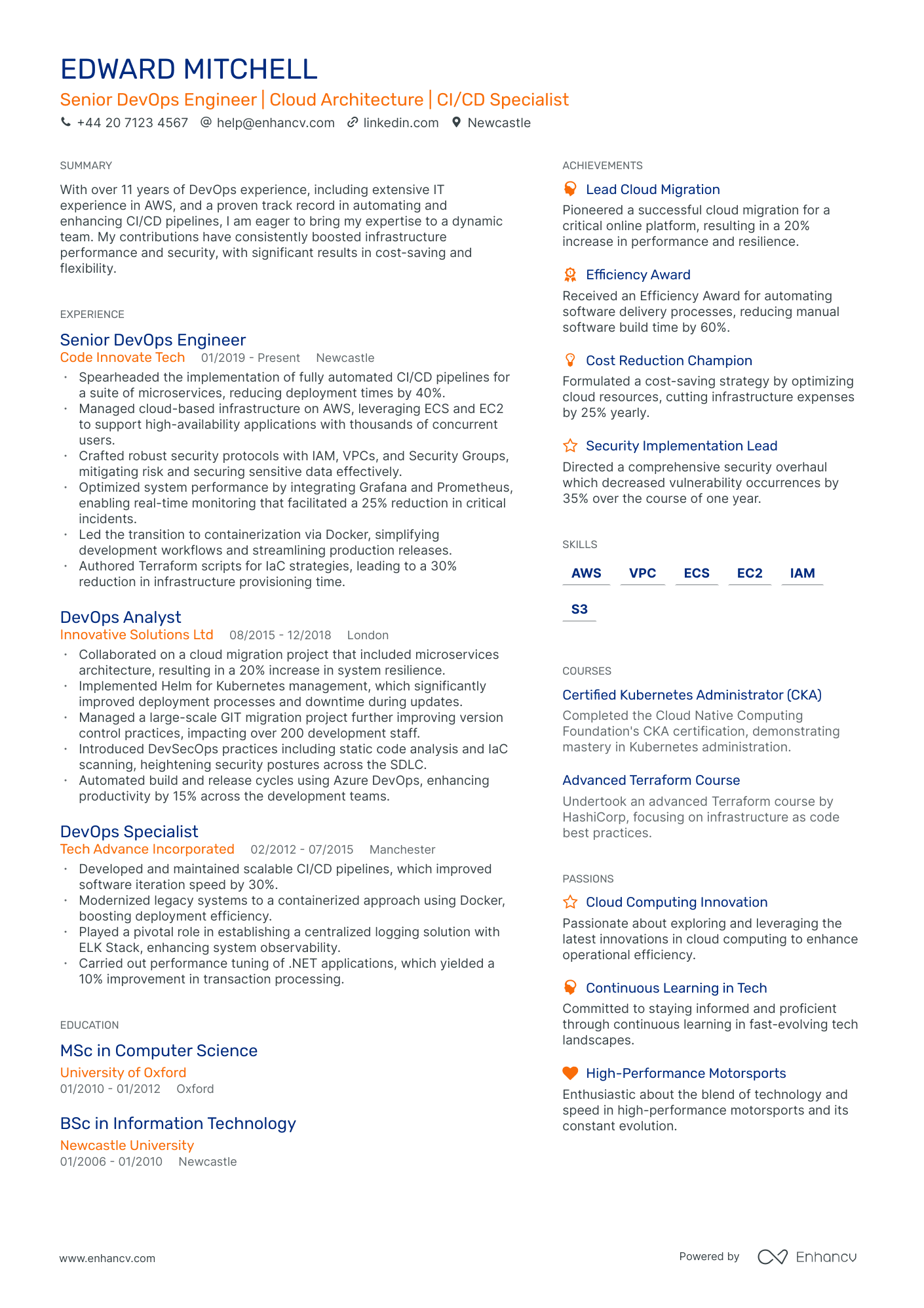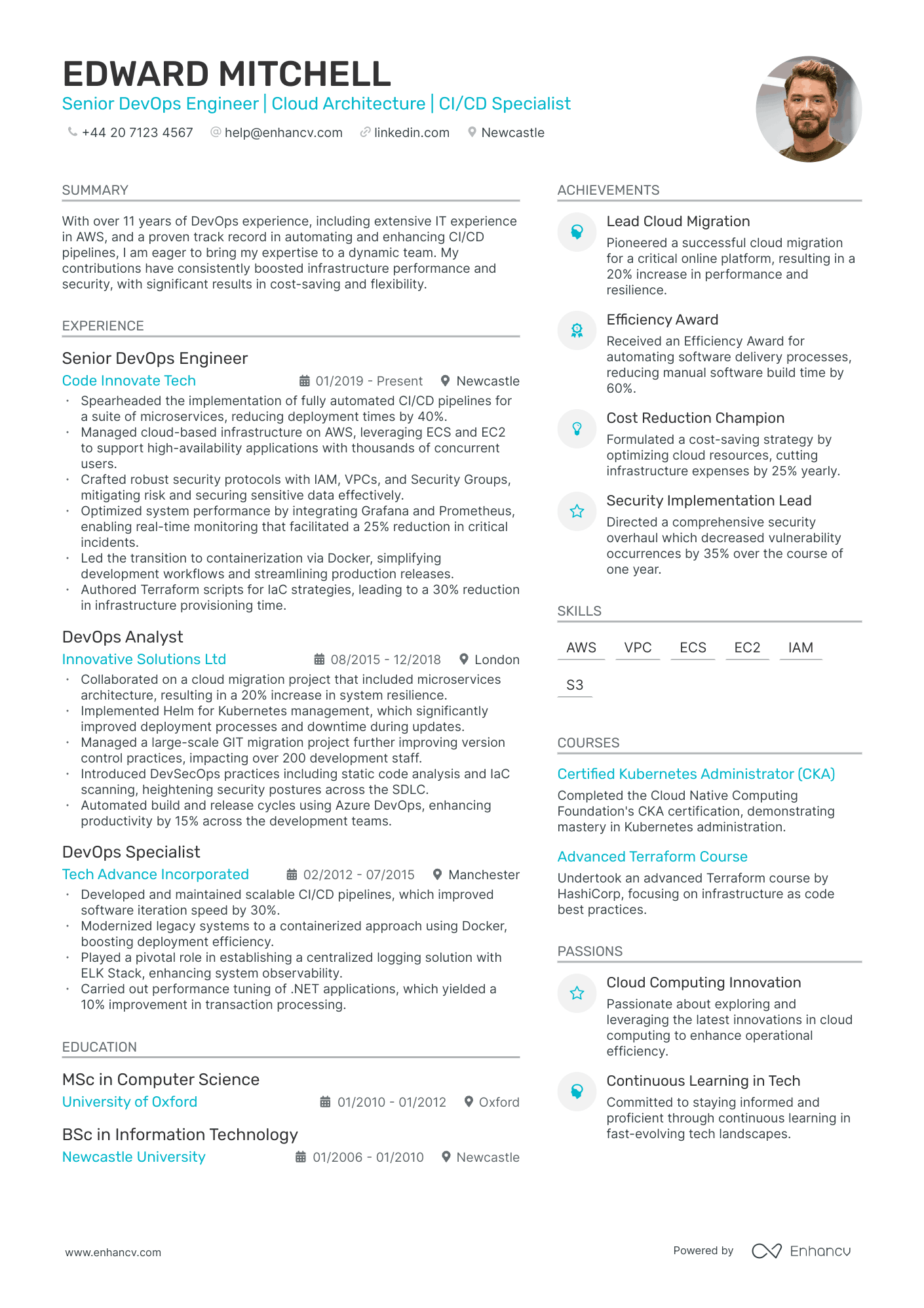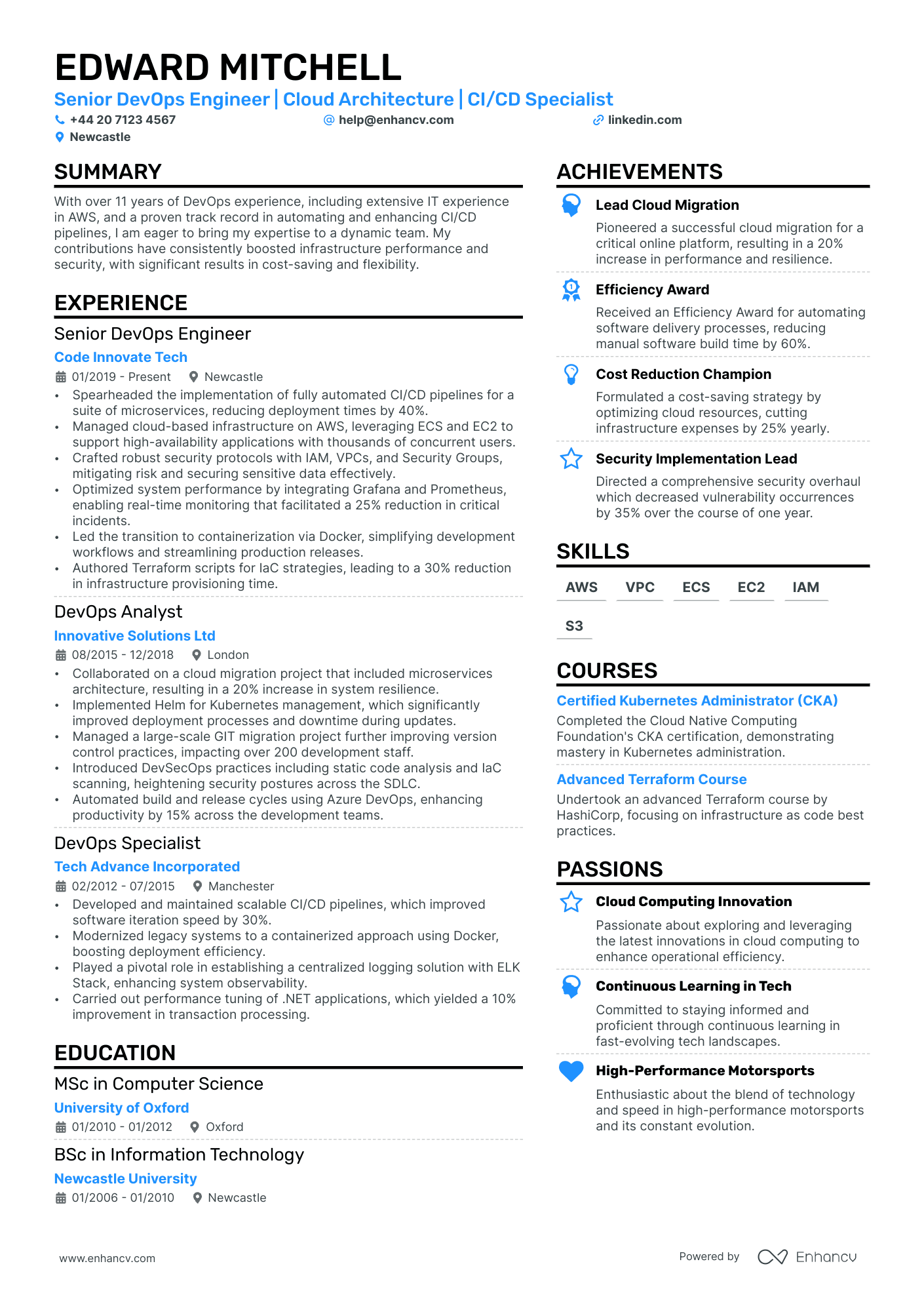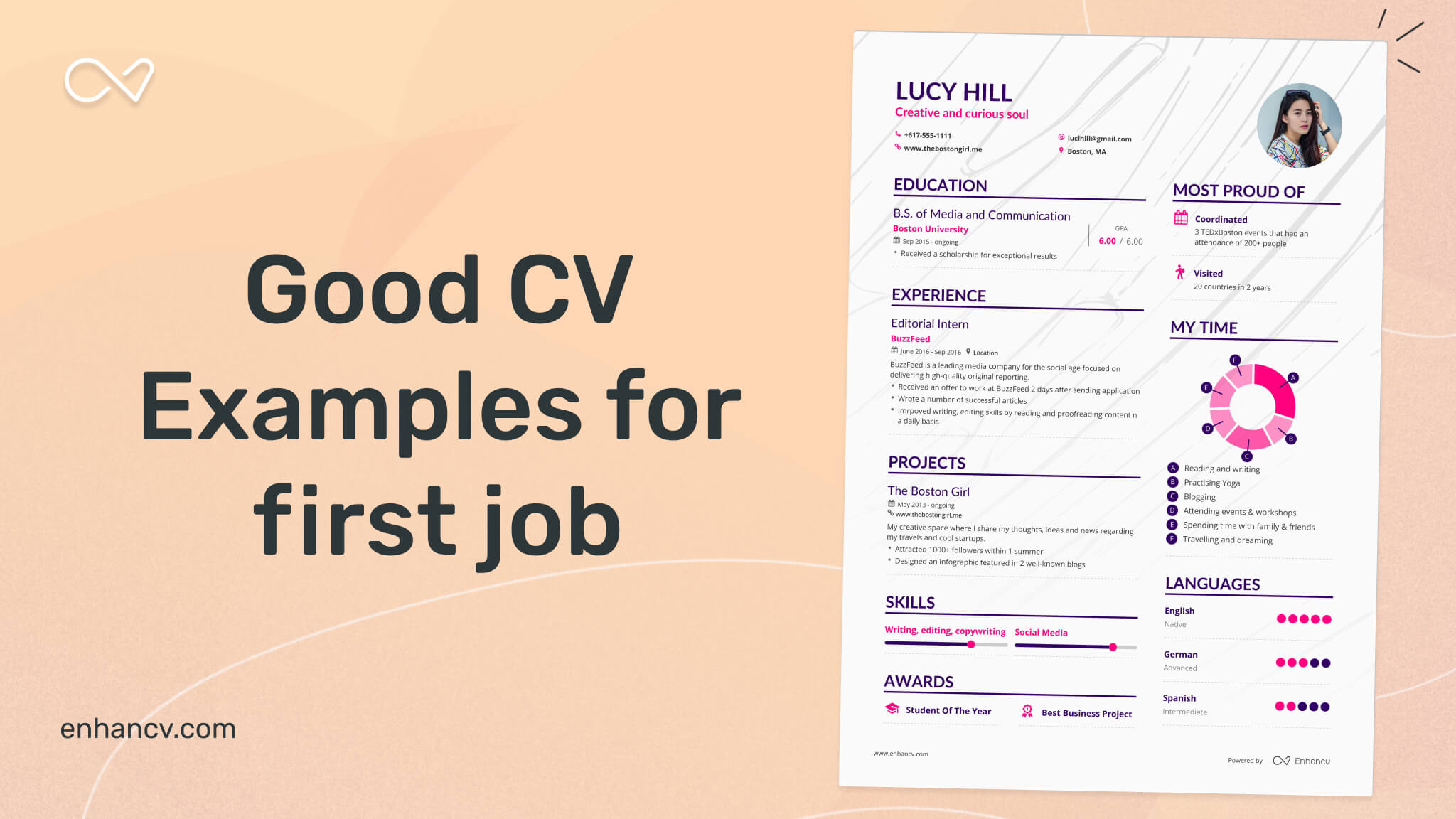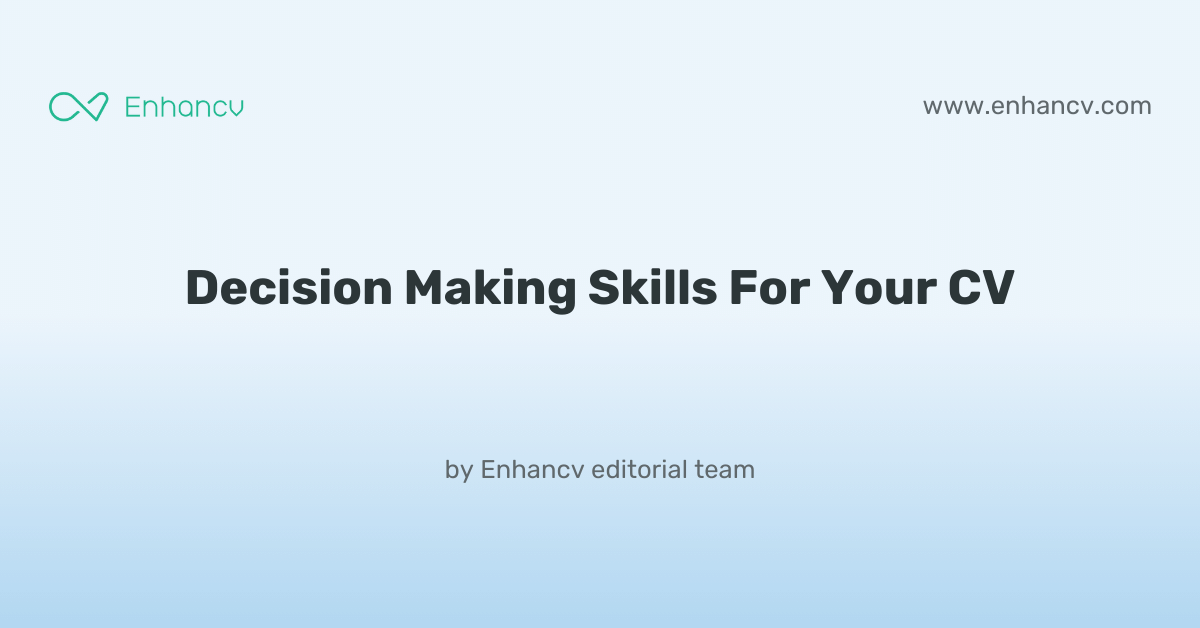Crafting a compelling CV can be daunting for DevOps professionals given the need to succinctly encapsulate a diverse skill set and complex project experiences. Fortunately, our guide provides clear strategies to distil your expertise into a potent summary that captures the attention of potential employers.
- Design and format your professional devops CV;
- Curate your key contact information, skills, and achievements throughout your CV sections;
- Ensure your profile stays competitive by studying other industry-leading devops CVs;
- Create a great CV even if you happen to have less professional experience, or switching fields.
When writing your devops CV, you may need plenty of insights from hiring managers. We have prepared industry-leading advice in the form of our relevant CV guides.
How to ensure your profile stands out with your devops CV format
It's sort of a Catch 22. You want your devops CV to stand out amongst a pile of candidate profiles, yet you don't want it to be too over the top that it's unreadable. Where is the perfect balance between your CV format simple, while using it to shift the focus to what matters most. That is - your expertise. When creating your devops CV:- list your experience in the reverse chronological order - starting with your latest roles;
- include a header with your professional contact information and - optionally - your photograph;
- organise vital and relevant CV sections - e.g. your experience, skills, summary/ objective, education - closer to the top;
- use no more than two pages to illustrate your professional expertise;
- format your information using plenty of white space and standard (2.54 cm) margins, with colours to accent key information.
Once you've completed your information, export your devops CV in PDF, as this format is more likely to stay intact when read by the Applicant Tracker System or the ATS. A few words of advice about the ATS - or the software used to assess your profile:
- Generic fonts, e.g. Arial and Times New Roman, are ATS-compliant, yet many candidates stick with these safe choices. Ensure your CV stands out by using a more modern, and simple, fonts like Lato, Exo 2, Volkhov;
- All serif and sans-serif fonts are ATS-friendly. Avoid the likes of fancy decorative or script typography, as this may render your information to be illegible;
- Both single- and double-column formatted CVs could be assessed by the ATS;
- Integrating simple infographics, icons, and charts across your CV won't hurt your chances during the ATS assessment.
PRO TIP
Be mindful of white space; too much can make the CV look sparse, too little can make it look cluttered. Strive for a balance that makes the document easy on the eyes.
The top sections on a devops CV
- Professional Summary emphasises your DevOps expertise and value proposition, providing a snapshot of your skills and experience.
- Technical Skills showcases your mastery in tools and technologies pertinent to DevOps, such as CI/CD, containerisation, and cloud platforms.
- Professional Experience details your career history with a focus on DevOps roles, responsibilities, and achievements.
- Education and Certifications highlight relevant degrees and DevOps-specific certifications like AWS Certified DevOps Engineer.
- Projects and Implementations section demonstrates your practical experience with real-world applications of DevOps practices.
What recruiters value on your CV:
- Highlight your experience with automation tools and scripts, showcasing your ability to streamline development, testing, and deployment processes.
- Emphasise your proficiency in cloud platforms like AWS, Azure, or GCP, which are integral to modern DevOps practices.
- Demonstrate your understanding of containerisation and orchestration by mentioning projects using Docker, Kubernetes, or similar technologies.
- Include instances of collaboration and communication with development and operations teams, stressing the importance of a DevOps culture and practices in past roles.
- Provide examples of monitoring and logging tools you've mastered, such as Prometheus or ELK stack, to underline your ability to maintain system health and performance.
Recommended reads:
Making a good first impression with your devops CV header
Your typical CV header consists of Your typical CV header consists of contact details and a headline. Make sure to list your professional phone number, email address, and a link to your professional portfolio (or, alternatively, your LinkedIn profile). When writing your CV headline , ensure it's:
- tailored to the job you're applying for;
- highlights your unique value as a professional;
- concise, yet matches relevant job ad keywords.
You can, for examples, list your current job title or a particular skill as part of your headline. Now, if you decide on including your photo in your CV header, ensure it's a professional one, rather than one from your graduation or night out. You may happen to have plenty more questions on how to make best the use of your CV headline. We'll help you with some real-world examples, below.
Examples of good CV headlines for devops:
- DevOps Engineer | Cloud Architecture & Automation Specialist | AWS Certified | 5+ Yrs Experience
- Senior DevOps Consultant | CI/CD Pioneer | Kubernetes Expert | Agile Advocate | 10 Years in Tech
- Junior DevOps Practitioner | Scripting Enthusiast | Linux & Docker | Entry-Level, Eager Learner
- Lead DevOps Architect | System Scalability & Security | Azure Solutions | 15+ Yrs Deep Expertise
- DevOps Analyst | Continuous Deployment Strategist | Certified Scrum Master | Problem Solver | 3 Yrs Dedicated Service
- Principal DevOps Engineer | Infrastructure as Code (IaC) Proponent | Certified Jenkins Engineer | 7-Year Industry Veteran
Your devops CV introduction: selecting between a summary and an objective
devops candidates often wonder how to start writing their resumes. More specifically, how exactly can they use their opening statements to build a connection with recruiters, showcase their relevant skills, and spotlight job alignment. A tricky situation, we know. When crafting you devops CV select between:
- A summary - to show an overview of your career so far, including your most significant achievements.
- An objective - to show a conscise overview of your career dreams and aspirations.
Find out more examples and ultimately, decide which type of opening statement will fit your profile in the next section of our guide:
CV summaries for a devops job:
- Seasoned DevOps engineer with over 8 years of experience in automating deployments, enhancing system reliability and streamlining release cycles. Proven expertise in Kubernetes and AWS cloud services. Distinguished by the ability to increase system uptime by 30% at TechSolutions Inc. through a custom CI/CD pipeline.
- Dynamic professional with a decade in software development, now pivoting to DevOps, bringing deep expertise in Python, Jenkins, and cross-functional collaboration. Instrumental in developing a scalable codebase at InnovateTech that reduced time-to-market by 25%.
- Accomplished systems administrator eager to transition to DevOps, armed with robust knowledge of Linux environments and scripting, plus a track record of improving server performance by 40% through automation and configuration management at DataCorp Ltd.
- Leading Cloud Engineer with an impressive 6 years of experience, transitioning into DevOps to leverage in-depth expertise in Azure, ARM templates, and PowerShell scripting. Recognised for designing and implementing a cloud migration strategy that improved system scalability by 50% at GlobalEnterprises.
- Highly motivated graduate determined to excel in DevOps, seeking to develop hands-on skills in continuous integration, automated deployments and cloud infrastructure management. Committed to contributing to project success and eager to be shaped by seasoned professionals.
- Ambitious individual aspiring to forge a career in DevOps, aiming to apply a solid foundation in programming and a keen interest in systems automation. Eager to learn from industry experts and become an asset to a forward-thinking team by delivering efficient, scalable solutions.
How to meet job requirements with your devops CV experience
We've now reached the essence of your actual CV - your experience section. This is the space where you can list your career roles and on-the-job successes. Many candidates tend to underestimate just how much time and effort they should put into writing this CV section. Your experience shouldn't be a random list of your responsibilities, but instead:
- Match the job description with your skills, values, and accomplishments;
- Start each bullet with a strong action verb, followed up with one key skill and your outcome of applying this skill;
- Spotlight parts of your career history that are relevant to the job you're applying for.
Before we move on, make sure to check out some professional CV experience sections.
Best practices for your CV's work experience section
- Implemented continuous integration and deployment pipelines using Jenkins and GitLab CI, significantly reducing deployment times and manual errors.
- Managed containerised applications using Docker and Kubernetes, ensuring high availability and scaling based on system demand.
- Configured and maintained monitoring and alerting systems using Prometheus and Grafana, enhancing system observability and proactiveness in incident management.
- Automated infrastructure provisioning and management with Terraform and Ansible, leading to a more consistent and auditable infrastructure as code approach.
- Designed and executed system scalability and disaster recovery strategies, ensuring service continuity during peak loads and outages.
- Collaborated with development teams to incorporate DevOps best practices, fostering a culture of continuous improvement and ownership across the company.
- Developed custom scripts in Python and Bash to automate routine tasks, saving hours of manual effort each week and reducing potential human error.
- Improved system security by implementing robust policies, conducting audits, and applying patches promptly, maintaining compliance with security standards like ISO 27001.
- Contributed to the development of an internal DevOps knowledge base and training materials, empowering other team members to adopt modern tools and methodologies.
- Orchestrated the migration of legacy systems to a microservices architecture, improving system scalability and reducing downtime by 30%.
- Implemented an infrastructure automation strategy using Terraform and Ansible, leading to a 40% reduction in time required for environment setup.
- Enhanced CI/CD pipelines using Jenkins, enabling continuous deployment with a 20% increase in release frequency and improved code quality.
- Developed robust monitoring solutions using Prometheus and Grafana, leading to a 25% improvement in system reliability.
- Streamlined development workflows by introducing Docker containers, resulting in a 15% boost in developer productivity.
- Managed a large-scale AWS cloud infrastructure, optimizing resource utilization and generating a 20% cost savings.
- Successfully led a DevOps team in deploying a Kubernetes cluster that increased application deployment velocity by 35%.
- Instituted proactive incident management practices that curtailed critical incidents by 40%, enhancing system stability.
- Collaborated on a multi-tenant cloud platform project, delivering a robust solution that accommodated a 50% surge in customer base.
- Automated software deployment procedures which increased deployment frequency by 25% and minimized rollback occurrences.
- Implemented a secure GitOps strategy for infrastructure management that bolstered security compliance across the board.
- Played a key role in architecting a cloud-native solution that ensured high availability for a critical financial services application.
- Facilitated the adoption of Continuous Delivery practices, which improved time-to-market for new features by 22%.
- Pioneered the use of Puppet for configuration management, leading to more consistent and reliable server configuration state.
- Enhanced system security by initiating a company-wide DevSecOps culture, thereby reducing security breach incidents by over 50%.
- Customized and managed a suite of development tools including JIRA and Confluence to align with agile workflow needs.
- Designed and maintained scalable production environments in a Rackspace hosted infrastructure, achieving 99.9% uptime.
- Developed an automated backup and disaster recovery plan that decreased potential data loss exposure by 80%.
- Coordinated cross-functional teams to integrate security into the software development lifecycle, significantly mitigating risk exposure.
- Optimized server provisioning processes with CloudFormation, enabling a consistent and rapid setup for new projects.
- Contributed to designing a service mesh with Istio to simplify network management and enhance microservices communication security.
- Initiated a company-wide containerization strategy with Docker, cutting down application deployment times by over 30%.
- Managed the transition to a serverless architecture with AWS Lambda, reducing operational costs by 25%.
- Implemented a comprehensive logging system with ELK Stack, providing deeper insights into system performance and user behavior patterns.
How to ensure your devops CV stands out when you have no experience
This part of our step-by-step guide will help you substitute your experience section by helping you spotlight your skill set. First off, your ability to land your first job will depend on the time you take to assess precisely how you match the job requirements. Whether that's via your relevant education and courses, skill set, or any potential extracurricular activities. Next:
- Systematise your CV so that it spotlights your most relevant experience (whether that's your education or volunteer work) towards the top;
- Focus recruiters' attention to your transferrable skill set and in particular how your personality would be the perfect fit for the role;
- Consider how your current background has helped you build your technological understanding - whether you've created projects in your free time or as part of your uni degree;
- Ensure you've expanded on your teamwork capabilities with any relevant internships, part-time roles, or projects you've participated in the past.
Recommended reads:
PRO TIP
If applicable, briefly mention a situation where things didn’t go as planned and what you learned from it, demonstrating your ability to learn and adapt.
Key devops CV skills: what are hard skills and soft skills
Let's kick off with the basics. You know that you have to include key job requirements or skills across your CV. For starters, take individual skills from the job description and copy-paste them into your CV, when relevant. Doing so, you'll ensure you have the correct skill spelling and also pass the Applicant Tracker System (ATS) assessment. There are two types of skills you'll need to include on your CV:
- Hard skills - technical abilities that are best defined by your certificates, education, and experience. You could also use the dedicated skills section to list between ten and twelve technologies you're apt at using that match the job requirements.
- Soft skills - your personal traits and interpersonal communication skills that are a bit harder to quantify. Use various CV sections, e.g. summary, strengths, experience, to shine a spotlight on your workspace achievements, thanks to using particular soft skills.
Remember that your job-winning CV should balance both your hard and soft skills to prove your technical background, while spotlighting your personality.
Top skills for your devops CV:
Linux/Unix Administration
CI/CD Tools (Jenkins, GitLab CI, CircleCI)
Containerization (Docker, Kubernetes)
Infrastructure as Code (Terraform, Ansible)
Cloud Services (AWS, Azure, GCP)
Version Control (Git)
Scripting (Bash, Python)
Monitoring Tools (Prometheus, Grafana)
Network, Security, and Compliance Management
Databases (SQL, NoSQL)
Problem-Solving
Collaboration
Adaptability
Continuous Learning
Time Management
Communication
Attention to Detail
Critical Thinking
Stress Management
Strategic Planning
PRO TIP
If there's a noticeable gap in your skillset for the role you're applying for, mention any steps you're taking to acquire these skills, such as online courses or self-study.
Listing your university education and certificates on your devops CV
The best proof of your technical capabilities would be your education and certifications sections. Your education should list all of your relevant university degrees, followed up by their start and completion dates. Make sure to also include the name of the university/-ies you graduated from. If you happen to have less professional experience (or you deem it would be impressive and relevant to your application), spotlight in the education section:
- that you were awarded a "First" degree;
- industry-specific coursework and projects;
- extracurricular clubs, societies, and activities.
When selecting your certificates, first ask yourself how applicable they'd be to the role. Ater your initial assessment, write the certificate and institution name. Don't miss out on including the completion date. In the below panel, we've curated relevant examples of industry-leading certificates.
PRO TIP
If you have received professional endorsements or recommendations for certain skills, especially on platforms like LinkedIn, mention these to add credibility.
Recommended reads:
Key takeaways
Your successful job application depends on how you well you have aligned your devops CV to the job description and portrayed your best skills and traits. Make sure to:
- Select your CV format, so that it ensures your experience is easy to read and understand;
- Include your professional contact details and a link to your portfolio, so that recruiters can easily get in touch with you and preview your work;
- Write a CV summary if you happen to have more relevant professional experience. Meanwhile, use the objective to showcase your career dreams and ambitions;
- In your CV experience section bullets, back up your individual skills and responsibilities with tangible achievements;
- Have a healthy balance between hard and soft skills to answer the job requirements and hint at your unique professional value.
